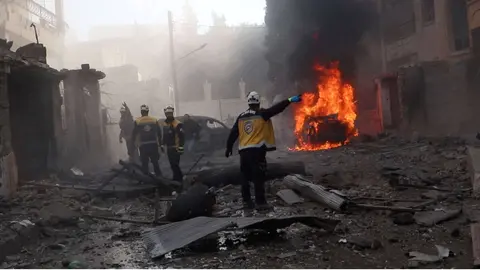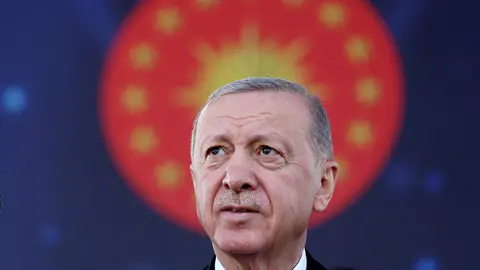It turns out the Syrian civil war was not over

Its bloody civil war, which began in 2011, with its massive flight of refugees, a movement that caused one of the biggest crises in the history of the European Union, seemed to have reached a status quo from the end of 2016, when President Bashar Al-Assad's army finished conquering Aleppo, the country's second city and, despite everything, its true economic capital.
The map of the country took on different colours, depending on which areas were stabilised, with almost 70% under the control of forces loyal to al-Assad, while the various rebel groups were pushed north and west, especially in the border area with Turkey, whose President Recep Tayyip Erdogan has always supported them, as well as reserving control of a ‘security strip’.
He cited the threats posed to Turkey by the Kurdish groups established in this strip, which also occupied several neighbourhoods in the city of Aleppo and, of course, Idlib, which they govern and control practically in its entirety.
The civil war broke out under the pretext of putting an end to the implacable dictatorship of Bashar Al-Assad, and the fighting was joined not only by political dissidents of the regime, but above all by ethno-religious groups who could not stand the fact that the Alawite Al-Assad had become a key ally of the Shi'ism led by the Islamic regime of Iran. Iran thus became from the beginning of the war the strongest supporter of al-Assad's Syria, both through military advisors and supplies and through the action of Hezbollah's Shia militias.
Russia, in turn, also sided with the Syrian regime, giving it almost total control of the Tartous naval base, which Vladimir Putin's navy has taken over, and full use of the Khmeimim air base in Latakia. It is from the latter that Russian bombers, together with Assad's air force, are launching the counter-offensive against the rebel forces.
As for the latter, although with different nuances, almost all belonged to Sunni groups: the Free Syrian Army, the Islamic Front, the Army of Conquest or Al Nusra, directly under the orbit of al-Qaeda.
Now, the offensive launched by the rebels in Aleppo, from where they have ousted both the governor appointed by Damascus and the troops loyal to Al-Assad, claim to be members of Hayat Tahrir Al-Cham (HTC), the Levant Liberation Organisation, known for its radical Islamism close to jihadism. For the Al-Assad regime, they are simply ‘terrorists’, against whom it has promised to ‘use the necessary force to eradicate them’.
With hostilities reopened, Tehran has once again reaffirmed its ‘unwavering support’ for Damascus, where Iranian Foreign Minister Abbas Araghtchi rushed to, while Russia immediately proceeded to bomb the enclaves seized by the rebels. Araghtchi used the occasion to call for ‘coordination’ with Moscow to ‘defeat the [Syrian] terrorist groups again’.
Jordan's King Abdullah II declared that he ‘stands by Syria, its territorial integrity, sovereignty and stability’. The Hashemite monarch is particularly attentive to Israel's moves and plans for the West Bank, where hostility between Palestinians and Israeli settlers has intensified.
For their part, the United States, France, Germany and the United Kingdom issued a joint statement in which they ‘call on all parties to de-escalate and protect civilians and infrastructure to avoid further displacement and disruption of humanitarian aid delivery’.
Underlying this communiqué is the signatory countries' fear of further mass movements of displaced populations in a country that still has a third of its inhabitants outside its borders. Washington directly blames Assad, though without naming him explicitly, for this resurgence of the war, ‘a consequence of his refusal to engage in political dialogue [with the opposition] while maintaining a strong dependence on Russia and Iran’.
And finally, the United Nations, through its special envoy to Syria, Geir Otto Pedersen, describes the resumption of the civil war as a ‘collective failure’, which once again highlights the need for a genuine political process, as prescribed by Security Council Resolution 2254, passed in 2015.
In the end, as Luc de Barochez states in Le Point, ‘a geopolitical shock sometimes generates unforeseen consequences far from its point of impact’. This law is once again evident in this new awakening of the Syrian civil war. For this expert, the spectacular conquest of Aleppo by the rebels, supported by Turkey, ‘threatens the entire Shiite Crescent, which stretches from Tehran to Beirut, shakes the regime in Damascus and puts the Iranian-Russian axis on the defensive’.



